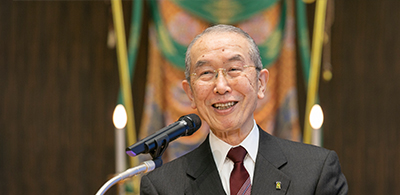Calling to Mind the Regarder of the Sounds
June 2021

Becoming Aware of Your Own Abilities
Chapter 25 of the Lotus Sutra, “The Bodhisattva Regarder of the Sounds of the World” (sometimes called the Regarder of Sounds Sutra), is popular with many people in East Asia. We draw strength from the teaching that when we are suffering, if we sincerely call to mind the Regarder of Sounds, she immediately responds to our voice and liberates us from suffering.
This is why the Regarder of Sounds has many followers. However, hearing only this, it may seem like following her is merely the belief that we can ask for and receive divine benefits. But I think that if calling her to mind can serve as the catalyst to seriously turning toward the teachings of the Buddha, doing so should be respected as a gateway to the faith.
This said, I also believe that the Regarder of Sounds Sutra is not merely the teaching that all we have to do is call her to mind and she will liberate or help us, because it is included in and infused with the spirit of the teachings of the Lotus Sutra.
One of these teachings is the importance of being aware of your own abilities. Every day, when we perform sutra recitation, we recite this verse: “The wondrous wisdom power of the Regarder of Sounds / Can free them from the sufferings of the world.” Regarding the meaning of these words, Founder Niwano said, “When you are facing some hardship, the strength to turn the situation around actually comes from within. It is the incredible spiritual power that develops by taking nourishment from that hardship.”
This means that our inherent power to rise from the depths of suffering and grow by turning suffering into nourishment is, in fact, “the wondrous wisdom power of the Regarder of Sounds.”
The poet Sansei Yamao (1938–2001) said that when we call to mind the Regarder of Sounds, we call to mind the dynamic power to live that we have inside us. In other words, we ourselves are the Regarder of Sounds, and when we believe in our own abilities—and earnestly call to mind the power of our inner Regarder of Sounds—our hearts will be filled with feelings of reassurance and our minds energized, both of which signify liberation from suffering.
The Desire to Liberate All People
When we are in the midst of suffering and about to give up hope, if we suddenly realize that no suffering lasts forever, we gain courage and hold firm. When we are tormented by feelings of loneliness and the impulse to die presses upon us, we can regain the power to live by remembering someone who watched over us with loving-kindness.
This is the moment when we awaken to the truths that all things are impermanent and all things are without self—the moment when our new lives begin. Even if at the time you didn’t recognize it as the Buddha’s teaching, there is no doubt that you were able to lift yourself up through the wisdom power (that is, the wondrous wisdom power) that you yourself possess.
When some people are really suffering, they may implore, “Regarder of Sounds, please help me.” Of course, this is all right. Even if such an invocation is for earthly benefits, as long as those in suffering are sincere in calling to mind the Regarder of Sounds, when they become one with their inner Regarder of Sounds, it is their own inherent power at work.
In this sense, just like the aphorism “skillful means are truth” indicates, the Regarder of Sounds Sutra teaches us that anyone who can become aware of their buddha nature through skillful means (calling to mind the powers of the Regarder of Sounds) is liberated and opened up to the realm of complete freedom.
Furthermore, the Regarder of Sounds Sutra repeatedly explains how the Bodhisattva Regarder of the Sounds of the World employs various methods to liberate people from suffering. And isn’t this yet another form of skillful means that makes us realize we have the same desire as the Regarder of Sounds to liberate all people? By calling to her to mind, if you realize you want to bring people happiness and peace of mind like the Thousand-Armed Regarder of Sounds who extends one thousand arms to do so, you take a step forward in the practice that makes you a bodhisattva. The Regarder of Sounds Sutra teaches us the importance of this.
We all have a bodhisattva we aim to emulate, whether the Regarder of Sounds, Ksitigharba, Never Unworthy of Respect, or another. We also all have our own way of walking as a bodhisattva. I will explore this in the next issue, where I will discuss bodhisattva practices.




